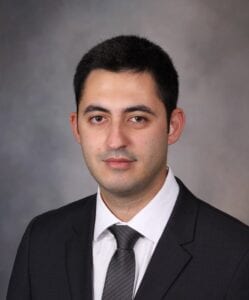
Trainee Author: Ozan Dikilitas, M.D.
Senior Research Fellow
Department of Cardiovascular Medicine
Mayo Clinic Rochester, MN
Polygenic risk scores (PRSs) for coronary heart disease are primarily derived from European ancestry cohorts. How valid are these when trying to apply them on diverse cohorts? In this month’s Trainee Paper Spotlight, Ozan Dikilitas and colleagues present the potential clinical utility of these PRSs along with emphasizing the need to assemble diverse cohorts to generate ancestry- and ethnicity-specific PRSs. In this study they investigated associations of two restricted PRSs and two genome-wide PRSs in three racial and ethnic groups (European, African ancestry and Hispanic) included in the eMERGE cohort. They found that PRSmetaGRS (one of the genome-wide PRSs) was the best performing PRS associated with coronary heart disease in all three cohorts and that hazard ratios were comparable for European and Hispanic cohorts but were significantly attenuated in African ancestry cohort.
ASHG: Could you describe your research for us?
Dr. Dikilitas: My research focuses on elucidating genetic architecture of atherosclerotic cardiovascular diseases such as coronary heart disease as well as related traits such as lipids. I am very interested in leveraging findings and insights from genetic epidemiology studies into clinical risk prediction models/tools that can refine risk stratification of individuals and improve clinical care.
ASHG: What are your career goals?
Dr. Dikilitas: I am in the process of transitioning from my role as a senior research fellow to become a resident physician in the Mayo Clinician-Investigator training program starting this summer. I hope to continue my research as part of this program and keep working in the field of cardiovascular genomics as a physician-scientist upon graduation.
ASHG: Why did you choose genetics as your field of study?
Dr. Dikilitas: From a personal standpoint, long history of early onset heart disease in my family drew me into the field of cardiovascular genomics. I am passionate about advancing our understanding of the biology of cardiovascular diseases and development of novel genetic risk prediction/treatment modalities. Furthermore, I very much enjoy working with genomic data, bioinformatics pipelines and derive clinically useful insights from very large genomic datasets.
ASHG: If you could pick three words that describe yourself, what would they be?
Dr. Dikilitas: Resilient, Adaptable, Creative
